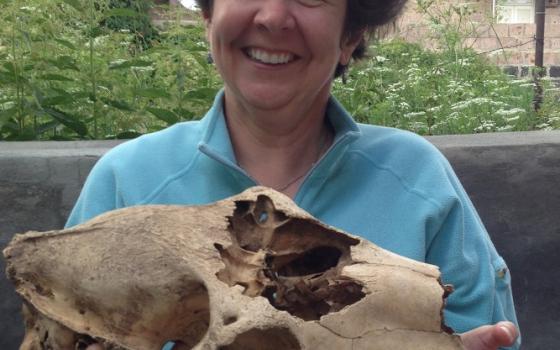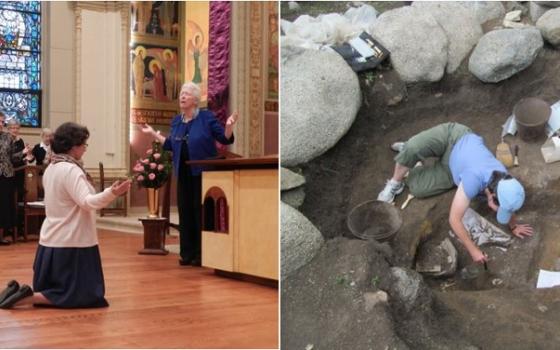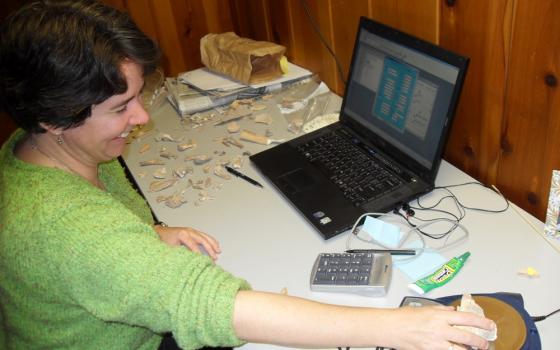You can take Benedictine Sr. Belinda Monahan out of the dig site, but good luck getting the dirt out from under her fingernails.
Monahan, 44, is an archeologist; she holds a doctorate in anthropology from Northwestern University and works part-time as a research associate at the University of Chicago. Every summer, she spends about a month at a dig site in Armenia, a joint project of Cornell and Purdue universities and the Armenian Institute of Archeology and Ethnography.
On Dec. 14 she professed her final vows at St. Scholastica Monastery in Chicago.
What does being a Benedictine sister have to do with digging up bones? And vice versa?
Certainly, the Benedictines have been known as keepers of history: Benedictine monasteries in the Middle Ages kept research and learning alive. So there’s a nice tie-in there between the two. Archeology has also allowed me to look at the long perspective of religious life: What does it look like now, what did it look like 50 years ago, 100 years ago? It gives me a different perspective on who we are and what that means for the future. And Benedictines are an ancient order [they were formed in 529 A.D.], so they have that long perspective, too.
There’s also community – at the dig with all the researchers, we live together for a month or two every summer. We eat together, go off to work together, and we each have our role. It’s a different form of community, but it’s very much community life.
I also like the collaborative aspect of archeology – with two universities and the Institute of Archeology and Ethnography, the dig is very much a collaborative project. This last time, I was one of only a few on the site who don’t speak Armenian – the others have been learning it so they can better fit in. I think that’s important, that we’re trying to collaborate; we’re not imposing.
Another thing is that archeology, like spiritual life, is not instant gratification. You don’t always see results immediately, but if you look back and say, ‘That’s where I was a year ago,’ you do see the results. You also have a role to play – your piece in the puzzle. You don’t solve the entire thing by yourself, and all the different roles matter. That’s why I find community so important – when you have community around you, you have people saying, ‘Here’s my piece,’ which is useful.
So what are you digging up, and what is it telling us?
We have a story about how states developed in the world, and what we’re seeing in Armenia is that it didn’t happen the same way as it did in, say, southern Iraq, which is known as the cradle of civilization. Their cultures were organized differently. People in Mesopotamia developed what we think of as cities, where you had one small area with lots of people and lots of different activities in different parts of the city. But that’s not what we’re finding in Armenia. The valley we’re in, there are lots of graves, but we’re not finding a lot of evidence of people living there. We’re finding ritual areas, with huge walls, but not a lot of living space. People say nomads can’t have a state, but we don’t know where these people were living, so maybe you can.
I’m looking at the animal bones. I’m looking at bones from about 3300 B.C., 1200 B.C. and about 300 B.C., and seeing how they’re different, what stages they’re at and who’s controlling the economy. I’m finding a lot of young sheep and goats – but they weren’t herding them. They were used in some kind of ritual sacrifice, because mainly what we’re finding is the heads.
Like spiritual life, you don’t always get all the answers right away. Sometimes you spend your whole life looking for them.
And you seem to have found at least one answer – religious life – later in life. How did that happen?
It was not at all gradual – it was very sudden. I had been singing in the choir at Northwestern’s Catholic center for close to 10 years, and I just gradually started getting more involved. First with the bread-baking ministry, then I got into the liturgy team. Then I started going to daily Mass and then daily prayer – none of those seemed like huge decisions, none were even conscious decisions; I just sort of drifted into it. But I decided I needed to talk to someone about why I was doing all this. And when I did, they asked if I had ever thought about religious life, and I honestly said, ‘No.’ I hadn’t. But even a year later, I couldn’t make the thought go away.
Many people would wonder why you would ‘give up’ so much – you have a doctorate in anthropology – to become a sister. But you don’t sound like you feel you’ve made a sacrifice.
From the outside, it is difficult to understand. And when I first looked at religious life, I looked at what I was going to have to give up, but I have gotten so much more in return. It’s hard to put my finger on what I’ve gotten, but it has to do with my relationship with God, my relationships with other people – things you can’t quantify. For me, it’s not as important to have a successful career as to have a relationship with God where he’s the center of my life.
[Dan Stockman is national correspondent for Global Sisters Report. Follow him on Twitter at #DanStockman or on Facebook.]



